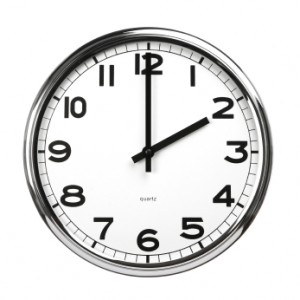
Do We Need to Pay for Eight Hours of Work Because of the Switch to Daylight Saving Time?
This week’s question comes from Charlie, a manufacturing plant manager. We have a third shift that works from 11 pm to 7 am the following day. Some of the workers will work this Saturday night into Sunday. Do we need to pay for eight hours of work because of the switch to Daylight Saving Time? Answer: Since Daylight Saving Time begins in most parts of the country at 2 am, Sunday, March 13, 2011 many workers on a third shift will only work seven hours. At 2 am on that day, clocks are turned ahead to 3 am.
FLSA Does Not Require Pay for Hour When Clocks Are Turned Ahead
The Fair Labor Standards Act (FLSA) does not require employers to pay employees for the hour not worked. When Daylight Saving Time ends on November 6, 2011, employers will need to pay an extra hour since clocks are turned back.
Contact Vision Payroll for More Information
Contact Vision Payroll if you have any further questions on the switch to Daylight Saving Time.

How Many Hours Do We Need to Pay for Work on the Third Shift This Saturday Night?
This week’s question comes from Meg, an HR manager. We have a third shift that works from 11 pm to 7 am the following day. Some of the workers will work this Saturday night into Sunday. How many hours do we need to pay for work on the third shift this Saturday night? Answer: Since Daylight Saving Time ends in most parts of the country at 2 am, Sunday, November 7, 2010, many workers on a third shift will work nine hours. At 2 am on that day, clocks are turned back to 1 am. Clocks will remain on standard time until the switch to Daylight Saving Time on March 13, 2011.
FLSA Requires Payment for Extra Hour
The Fair Labor Standards Act (FLSA) requires employers to pay employees for the extra hour worked. Some employees may be entitled to overtime if they work forty-one hours in the pay period instead of the usual forty. Under the FLSA, non-exempt employees are generally entitled to time and one-half pay for any overtime worked.
Switch to Standard Time Complicates Payroll Calculations
Contact Vision Payroll if you have any further questions on the switch to Standard Time.
Since Daylight Saving Time begins in most parts of the country at 2 am, Sunday, March 14, 2010, many workers on a third shift will only work seven hours. At 2 am on that day, clocks are turned ahead to 3 am. The Fair Labor Standards Act does not require employers to pay employees for the hour not worked. Contact Vision Payroll if you have any further questions on the switch to Daylight Saving Time.
This week’s question comes from Greg, a plant manager. We have a third shift that works from 11 pm to 7 am the following day. Some of the workers will work this Saturday night into Sunday. Do we need to pay for eight hours of work on the third shift Saturday night? Answer: Since Daylight Saving Time begins in most parts of the country at 2 am, Sunday, March 8, 2009 many workers on a third shift will only work seven hours. At 2 am on that day, clocks are turned ahead to 3 am. The Fair Labor Standards Act does not require employers to pay employees for the hour not worked. Contact Vision Payroll if you have any further questions on the switch to Daylight Saving Time.





Vision Payroll